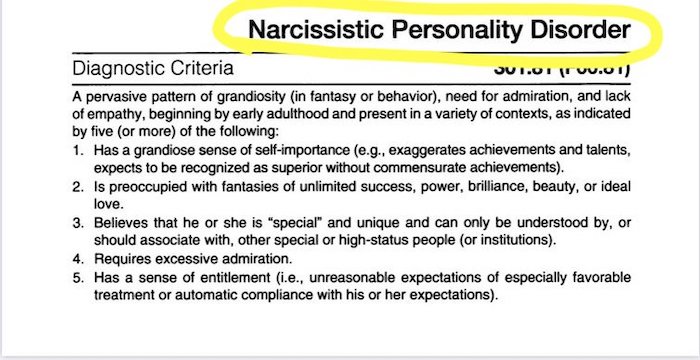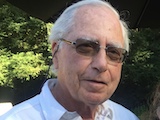
I was reading about a particular public figure the other day, as I have been doing for some four years now, whom I will refer to as “my crazy uncle”, for want of a better term. This guy is so bizarre that he almost defies belief. So, with my background as a psychiatrist, I put on my thinking cap and identified my “uncle’s” exact diagnosis: Malignant Narcissistic Personality Disorder.
This disorder is manifested by a multitude of personality traits: 1) the individual is highly manipulative and doesn’t care whom he hurts as long as he gets his way, 2) he doesn’t care about the pain he causes others, 3) he seeks to win at all costs, 4) he has no empathy for others, 5) he is paranoid, 6) he is preoccupied with fantasies of success, power, and brilliance, 7) he is not able to handle criticism, 8) he will lash out if he feels slighted in any way, and 9) he shares features of people with other personality disorders, such as sociopathy.
The problem with “my crazy uncle” is that he has no awareness of his disorder, and even if he did, seeking psychiatric help would be a fruitless endeavor. Psychiatric patients who benefit from treatment typically feel distressed by their symptoms, such as anxiety or depression, and they want to alleviate their discomfort. But people with malignant narcissistic personality disorder do not experience emotional discomfort; they simply are who they are, and they have no self-awareness of their dysfunctional nature.
My family (whom I think of as most of my fellow citizens) can’t figure out how to get our “crazy uncle” out of our lives. His antics, distortions of reality, and his outright lying make us all feel crazy much of the time. The trouble is that he is very creative at gaining the attention he so sorely needs because he feels so inadequate and insecure, so on a daily basis he says or does things so outrageous that he re-enters our awareness and gets our attention
I recently identified that the best strategies for me to manage the stress that my “uncle” creates. These include limiting the time I allow him to invade my mind by seeking spiritual awareness through greater contact with nature, and increasing my exposure to cultural areas like literature, art, and music; and I also seek solitude through meditation.
My inner struggles seem no different than those of many of my close friends in whom I confide. I realize that life brings with it many challenges but also offers the possibility of employing many coping strategies, including being an activist. But my primary responsibility is also to keep my own sanity so that I don’t become someone else’s “crazy uncle!”
I hope that my thoughts may help you if you are experiencing a similar situation in your own life during this stressful period.
 Hugh Winig, MD is a retired psychiatrist and is the author of a book of short stories and a book of humanistic aphorisms. He was a founding Trustee of the Lafayette Library and Learning Center and a past President of the East Bay Psychiatric Association. He has been an OLLI @Berkeley member for 10 years.
Hugh Winig, MD is a retired psychiatrist and is the author of a book of short stories and a book of humanistic aphorisms. He was a founding Trustee of the Lafayette Library and Learning Center and a past President of the East Bay Psychiatric Association. He has been an OLLI @Berkeley member for 10 years.